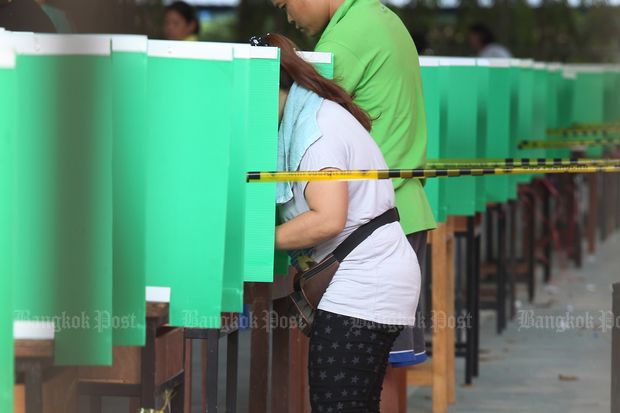
The chief of the Constitution Drafting Committee has shrugged off criticisms of large political parties about the proposed one-candidate, one-number election method.
The CDC said over the weekend they would drop the one-party, one-number system and replaced it with different numbers for candidates regardless of which party they belong to. In other words, a party will no longer be designated a number that can be used by its candidates in their campaigns.
In the election bill, a candidate will be assigned a number on a first come first served basis when he applies to represent a district. If more than one come at the same time, the numbers will be decided by a draw.
Politicians from Pheu Thai and Democrat parties strongly disagreed with the idea, saying the change would confuse voters.
In response, Meechai Ruchupan said on Monday the CDC wanted to make sure candidates had to work hard to win votes instead of counting on the popularity of their parties.
“We already set strict qualifications and prohibitions of candidates so voters should decide based on their merits. The change will also prevent vote-buying at a national level,” he said.
Mr Meechai added he was open to suggestions but he found the reasons cited by opponents of the change not valid enough.
To the criticism the change does not support the political party system, Mr Meechai said parties could be strengthened without a loophole for vote-buying.
“In the past, we used this system. The one-party one-number method was introduced and used only in the previous two elections,” he said.
The CDC chairman also dismissed the fear it would confuse voters, saying it was an insult to voters.
“People have changed. It’s not like 30-40 years ago when many couldn't read and understand politics. They no longer cast the ballots without knowing who they are voting for and what he looks like.”
The old system also makes it easy to mislead people, who don’t even have to remember the faces of the candidates, he added.
“If we don’t change, the saying ‘we can send an electric pole [as a candidate] and it still wins’ will come back. We want good, competent candidates and they must connect with voters instead of counting on their parties to bring victory,” he explained.
Seree Suwannapanon, a former chief of the now-defunct National Reform Steering Assembly’s political panel, said the proposed system would create a more level playing fields for large and small parties.
“A candidate will need to make himself useful to his constituency for some time to get elected. A nobody can’t just apply and rely on his party’s name to win.”
Like Mr Meechai, Mr Seree dismissed the criticism the change would not support the political party system as untrue.
“Elections are not the only way to strengthen parties. We need to ensure they really belong to people. If a party has policies that help people in general, it will win. Parties which grow by doing so need not worry about numbers because voters will remember them.
“The one-man,one-vote system makes it easy for large parties to campaign at the expense of small ones. A draw of numbers at each district is fairer,” he said.
In addition to the change, the bill prescribes voters who fail to cast ballots in any local or national election without good reasons will be banned from doing so for two years. It also introduced a complex cross-election system for senators.